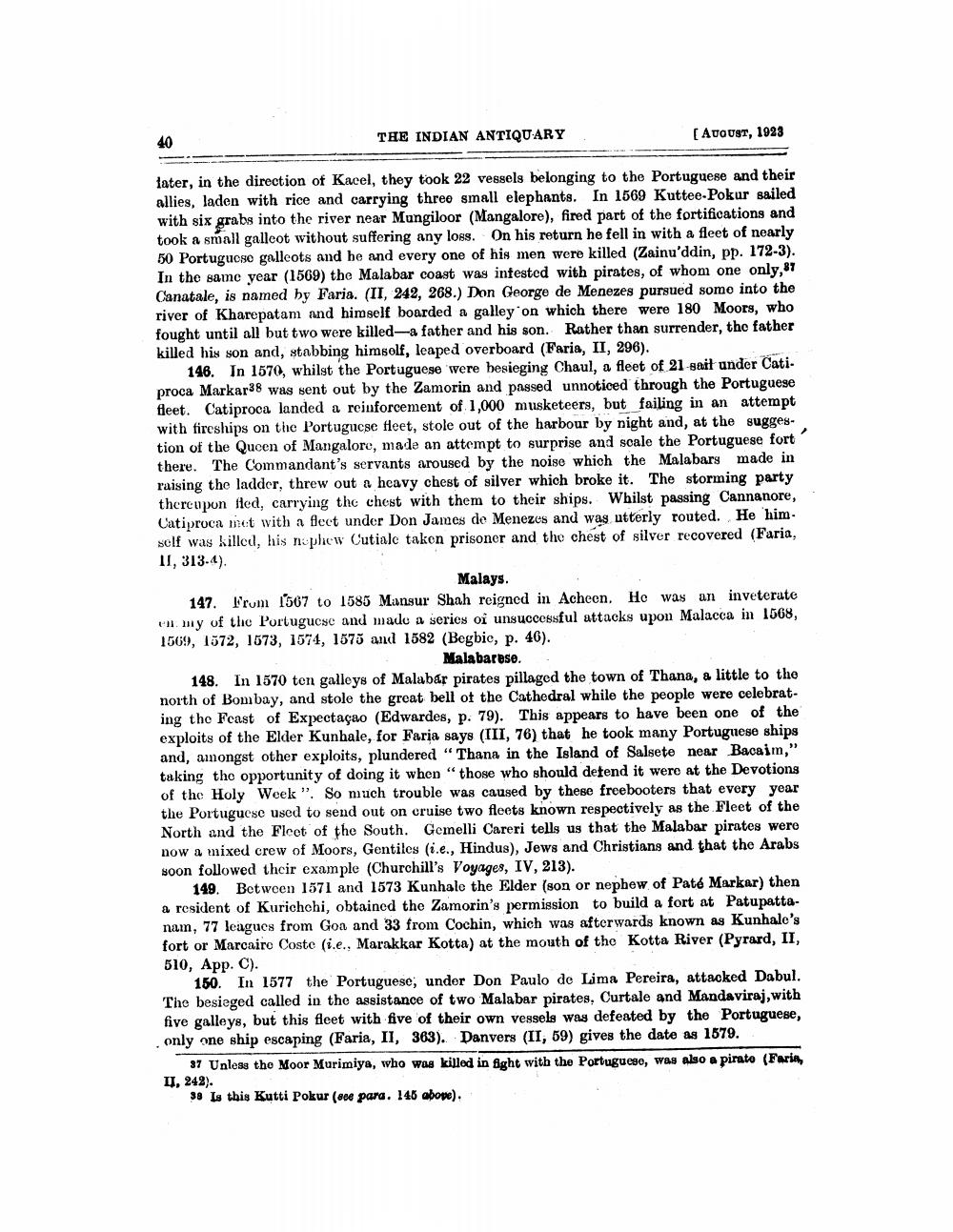________________
40
THE INDIAN ANTIQUARY
[AUDUST, 1928
later, in the direction of Kacel, they took 22 vessels belonging to the Portuguese and their allies, laden with rice and carrying three small elephants. In 1569 Kuttee-Pokur sailed with six grabs into the river near Mungiloor (Mangalore), fired part of the fortifications and took a small galleot without suffering any loss. On his return he fell in with a fleet of nearly 50 Portuguose galleots and be and every one of his men were killed (Zainu'ddin, pp. 172-3). In the same year (1569) the Malabar coast was infested with pirates, of whom one only, 87 Canatale, is named by Faria. (II, 242, 268.) Don George de Menezes pursued some into the river of Kharepatam and himself boarded a galley on which there were 180 Moors, who fought until all but two were killed-a father and his son. Rather than surrender, the father killed his son and, stabbing himself, leaped overboard (Faria, II, 296).
146. In 1570, whilst the Portuguese were besieging Chaul, a fleet of 21 sait under Cati. proca Markar38 was sent out by the Zamorin and passed unnoticed through the Portuguese fleet. Catiproca landed a reinforcement of 1,000 musketeers, but failing in an attempt with fireships on the Portuguese fleet, stole out of the harbour by night and, at the suggestion of the Qucen of Mangalore, made an attempt to surprise and scale the Portuguese fort there. The Commandant's servants aroused by the noise which the Malabars made in raising the ladder, threw out a heavy chest of silver which broke it. The storming party thereupon Hed, carrying the chest with them to their ships. Whilst passing Cannanore, Catiproca met with a flect under Don James de Menezes and was utterly routed. He him. self was killed, his nophew Cutiale takon prisoner and the chest of silver recovered (Faria, II, 313.4).
Malays. 147. From 1567 to 1585 Mansur Shah reigned in Acheen. He was an inveterate my of the Portuguese and made a series oi unsuccessful attacks upon Malacca in 1568, 1569, 1572, 1573, 1574, 1575 and 1582 (Begbic, p. 46).
Malabarese. 148. In 1570 ten galleys of Malabar pirates pillaged the town of Thana, a little to the north of Bombay, and stole the great bell of the Cathedral while the people were celebrating the Feast of Expectaçao (Edwardes, p. 79). This appears to have been one of the exploits of the Elder Kunhale, for Faria says (III, 76) that he took many Portuguese ships and, amongst other exploits, plundered "Thana in the Island of Salsete near Bacaim," taking the opportunity of doing it when "those who should defend it were at the Devotions of the Holy Week". So much trouble was caused by these freebooters that every year the Portuguese used to send out on cruise two fleets known respectively as the Fleet of the North and the Floot of the South. Gemelli Careri tells us that the Malabar pirates were now a mixed crew of Moors, Gentiles (i.e., Hindus), Jews and Christians and that the Arabs soon followed their example (Churchill's Voyages, IV, 213).
149. Between 1571 and 1573 Kunhale the Elder (son or nephew of Paté Markar) then a resident of Kurichchi, obtained the Zamorin's permission to build a fort at Patupattanam, 77 leagues from Goa and 33 from Cochin, which was afterwards known as Kunhale's fort or Marcaire Costo (i.e., Marakkar Kotta) at the mouth of the Kotta River (Pyrard, II, 510, App. C).
150. In 1577 the Portuguese, under Don Paulo de Lima Pereira, attacked Dabul. The besieged called in the assistance of two Malabar pirates, Curtale and Mandaviraj, with five galleys, but this fleet with five of their own vessels was defeated by the Portuguese, only one ship escaping (Faria, II, 363). Danvers (II, 59) gives the date as 1579.
37 Unless the Moor Murimiya, who was killed in fight with the Portuguese, was also a pirate (Faria, II, 242).
38 Is this Kutti Pokur (sve para. 146 abowe).




